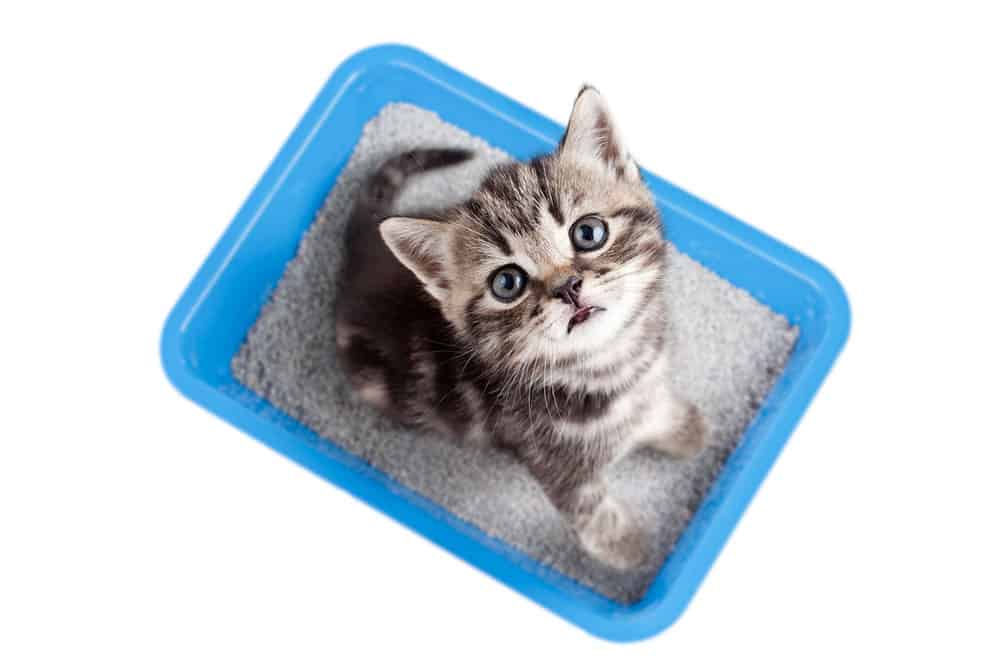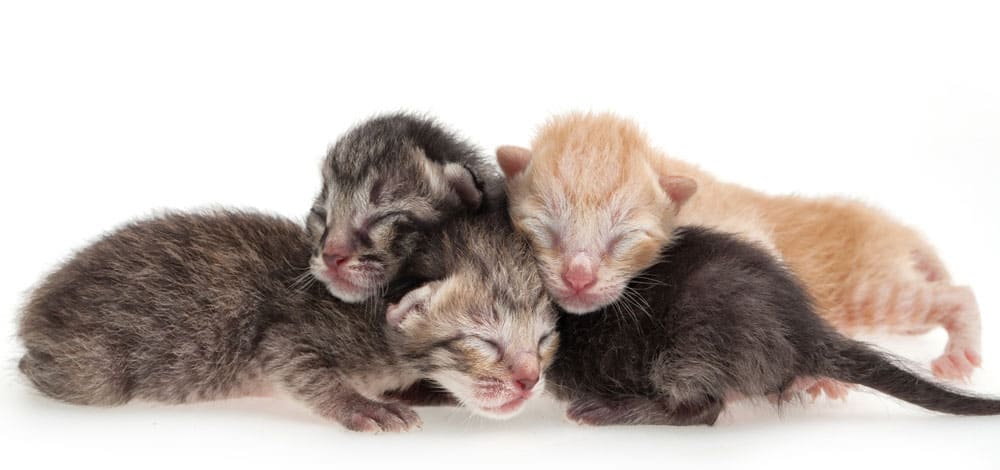Whether your cat gave birth or you rescued tiny furry orphans, you may be wondering when to start litter box training kittens? Not everyone knows when kittens start using the litter box and how to help them learn proper litter box etiquette. The litter box expert is here to help (don't worry - it's so much easier than training puppies!)

Table of Contents
Why newborn kittens don't use the litter box right away
Just in case you've never seen newborn kittens, here's a picture -

You'll notice that the sweet little things have their eyes shut. In fact, kittens are born blind and deaf. They also can't walk and can barely move on their own. All they know is how to fumble their way to the mother cat's nipples and latch on.
Clearly, these helpless creatures couldn't possibly use a litter box. They can't even see the box, let alone dig or cover after themselves. Which is important to remember when you're asking when do kittens start using the litter box.
When to start litter box training kittens? Most definitely not when they are this young!
So, how do newborn kittens poop?
It may surprise you to learn that newborn kittens cannot even defecate or urinate on their own. Without the right help from their mother, they would soon become constipated.
How does the mother help them? She gently licks and massages their tiny bellies and bottoms to help move things around. The next bit is a big gross but it's true. Mother cats eat whatever the kittens excrete.
Like with many other predators, feline mothers have strong instincts about keeping their babies out of sight and "out of smell" too. Which basically means eating up any biological material that can stink up the nest area.
Caring for newborn kittens' needs
Before we move on to discover when do kittens start using the litter box, we have to discuss the needs of newborns in the toilet department just a little bit more. It's not directly relevant to the question of "When to start litter box training kittens?" but it's important enough to mention all the same.
If you're caring for a mother cat with kittens
If the mother cat is there and knows what she's doing, there's nothing much for you to do as the owner, at least not in the litter box department.
Basically, make sure that the room is warm and the mother cat has access to quality food and plenty of water. Offer the same clean litter box as always, in the same location. Every now and again, the mother will leave the kittens to use the box or eat and drink. On the very basic level, let nature take its course.
Do keep an eye on things and if anything seems wrong with the mother cat or the kittens, call your veterinarian at once. There are post-birth complications in cats to watch out as well as possible health issues with the kittens, such as the fading kitten syndrome.
If you're caring for orphaned newborn kittens
If you came across an abandoned litter of newborns, you have your task cut out for you. Caring for newborn kittens is extremely demanding but also very rewarding. As far as their litter box needs - you'll have to play Mama Cat for them and gently rub their bellies and bottoms to encourage them to poop and pee. Fortunately, you can wipe off the end result instead of, well, eating it.
There's a lot you need to know though so the best piece of advice we can give you is to contact a local shelter or rescue organization. They should be able to put you in touch with an experienced rescuer who would either take the babies off your hand or guide you through helping them.
We'll start you off with a link to a basic yet thorough guide about hand-rearing kittens. This site is about litter boxes and we're here to discuss the question of "When to start litter box training kittens" so we won't go into more details. We did feel it was important to mention the basics in case you're dealing with newborns right now.
When do kittens start using the litter box then?
Kittens start out tiny but grow up fast. Within 2-3 weeks their eyes will open up gradually and they will immediately show an interest in their surroundings.
It's going to take several more weeks before they can walk and jump properly but they're likely to start trying almost at once. As soon as they start to explore around them, wobbly as they seem, it's time to introduce the litter box into their world.
The answer to "When do kittens start using the litter box?" will vary from one kitten to another. Generally speaking, it's between the third and fifth week of the kitten's life.
When to start litter box training kittens then?
That's one of the most common questions people ask. After all, with canines, there's a long training process of teaching the pup to "hold it" until his daily walk. The process seems to involve crates and pee pads and all sorts of training techniques.
Thankfully, cat owners don't have to deal with all of that!
Cats take to the litter box instinctively. All that has to happen is for them to find a suitable litter box and be of the right age. That's it.
Ask any rescuer. As soon as you bring in a tiny three-week-old kitten into a home, provide food and water and a litter box, the little creature will almost certainly use the litter box properly. Which is pretty amazing, isn't it?
So, introduce a litter box as soon as the kittens start wandering around - usually at the age of three weeks (the low end of the answer to "when do cats start using the litter box"). In effect that's when you start litter box training kittens. In most cases, that's all you have to do!
Getting the right litter box for your kitten
Yes, your kittens will possibly need a slightly different litter box than the one their mother - or any other adult cat - may be using.
The key here is accessibility.
Kittens are small in size. A three-week-old kitten weighs 10 ounces to a pound. It really is a tiny little thing. Kittens are also not very stable at first. It takes a while for them to develop the natural grace and sense of coordination that cats are famous for.
The bottom line is, climbing into a relatively high litter box, or trying to get through a flip door of a covered litter box may be too difficult for young kittens.
Instead, offer a relatively flat container that's easy to access. You can use a disposable litter box or even a homemade one. For the first week or two, any disposable tray will do, like these aluminum cooking/table pans -
As the kittens grow, they'll soon surprise you with their newly acquired motor skills and agility. Adjust the litter box accordingly. When the kittens are 5-6 weeks old, it's probably safe to switch to a regular open litter box.
Find out more: 10 Best disposable cat litter boxes on the market.
Where to put the litter box for young kittens
Kittens have active bowels and small bladders. Just like human toddlers, when they need to go - they need to go now!
Make sure their little litter box isn't too far from where they eat, drink and play. You should never put a litter box too close to a cat's food dish and that holds true for kittens as well. So not too close but not in another room either. On opposite corners of the same room is the best set up.
As the kittens grow older, you can let them play in other rooms and they should be able to find their way back to their litter box in time. That said, don't make that distance too long. If you live in a home with more than one floor, make sure kittens have a box on each floor. Don't make them choose your rug because it was so much closer just when they needed to go.
Still not sure? Read our guide about where to put the litter box. The principles we share there are true for cats of all ages.
What to do if the kittens aren't using the litter box?
Everyone makes mistakes. Especially when they're so young and still learning their way around the world (i.e. your home). Whatever you do, never ever punish or scold a kitten or cat for not using the litter box. They would prefer to use the box but something is preventing them from doing so. It's your job to find the reason and fix it.
You now know the answer to the question of when do kittens start using the litter box. At this point of "When to start litter box training kittens" you should realize that this is more about providing a suitable and accessible litter box than any form of "training". If you're confident that your kittens are old enough (i.e. older than 5 weeks), you should look for possible reasons for their litter box avoidance.
Common reasons for litter avoidance in kittens -
- The kittens have a health issue such as diarrhea
- The litter box is too small
- There is not enough litter in the box
- The litter box is too dirty
- The litter box is hard to reach
- It's too difficult for the kitten to enter the litter box
- Another cat or pet prevents the kitten from accessing the box
Let's address the various possible reasons one by one.
Health issues
Young kittens are fragile and sensitive. They can easily develop diarrhea for any number of reasons. The cause could be a viral or bacterial infection, a parasite or a food allergy.
The only person who may be able to tell you what's wrong with your kitten is the veterinarian. If your kitten suffers from diarrhea, call your vet and work on a solution.
Don't expect the kitten to make it to the litter box when the uncontrollable urge of diarrhea takes over. Do offer more boxes, strategically located so there's one very nearby wherever the kitten is. And generally speaking - When to start litter box training kittens? Definitely not when they are sick!
The litter box is too small
The right size for a litter box is one and half times the length of your cat, from the nose to the tip of the tail.
In a three week old kitten, that can be as small as 10-12 inches. But kittens grow fast and a month later, you're going to need a much larger litter box. If you haven't upgraded your litter box by that time, your kitten might avoid the box.
There isn't enough litter in the box
Regardless of the size of the box, make sure there's always two inches of litter in the box. Many cats can make do with more or less but not all of them. Two inches is a good depth to shoot for.
The litter box is too dirty
Cats - and kittens - like a clean box. If you read our guide about how often should you clean a litter box, you know that once a day is a minimum frequency for scooping.
With young kittens - especially if there's more than one of them - it's best to scoop twice a day and even more frequently if you can. Kittens have a very fast metabolism and they simply poop more often than adults. They're also clumsier and their chances of stepping in uncovered poop are higher. In short, clean it. Often.
The litter box is hard to reach
So far, we discussed pretty general reasons that would put many an adult cat off the box. Since this article chiefly answers the question: "When do kittens start using the litter box", we're back to covering (pardon the pun!) more kitten-specific reasons for litter box avoidance.
Remember the key to choosing a location for your kitten's litter box? It's accessibility.
Make sure your kitten has an accessible litter box. That means one that's not too far away from where he's playing. Don't make him climb up or down stairs to get to the box, or jump through any metaphorical hoops.
It's too difficult for the kitten to enter the litter box
This goes back to accessibility. Make sure the kitten can actually enter the box without too much maneuvering. With young kittens avoid boxes with high sides or top entry boxes.
If you're using a covered box, make sure the kitten can push the door easily and knows how to do that. You may need to take that flap down for a few weeks.
Another pet prevents the kitten from accessing the box
Young kittens can easily be intimidated by larger animals. If there are other cats or dogs in your home, make sure they don't block the way to the box. If your kitten is missing the box, keep an eye out to see that the larger pet isn't keeping the kitten from reaching the box in time.
If needs be, keep supervising the interaction to make sure it doesn't get too rough and that the little kitten can break it off when he wants to.
When to start litter box training kittens: Closing words
Whew, this has been yet another long post! We addressed the basic question of when to start litter box training kittens but also touched on many other important topics. We discussed how newborn kittens poop and pee, what kind of litter box they need once they're old enough, where to place that box and how to make sure your kitten can and does use it.
You may also find these posts interesting -
What can you use as an emergency cat litter?
We'd love it if you could help us spread the information online to help other cat owners. Please share on social media if you can. Here's a special image we made just for your Pinterest boards with this post title: When to start litter box training kittens. Thanks!






This was a great and informative read. We just rescued a kitten approximately 3 weeks old and I wasn’t sure about the box but will be training soon! Thank you!!!
I have an junior aged cat that keeps stooling outside the box. We have a little box that self cleans the poop a few minutes after they stool. My cat chooses to stool outside the litter box on the floor. We are changing the litter box at least 2 times per week to try to prevent it (even when the litter box is barely used) but it doesn’t seem to help. Do you have any suggestions to help us? We have 2 junior cats in our house and I believe it is the non- dominant cat that’s stooling outside the box. She also tends to be more shy and fearful. Any advice you can give would be greatly appreciated. Thank you.
Hi Heather,
Sorry to hear about the litter box elimination problem. We can suggest this guide over at TheCatSite.com. If you still need help, register for their forums (it’s free) and ask for help there.